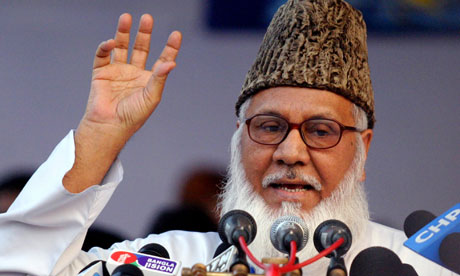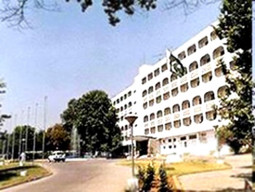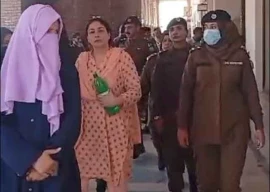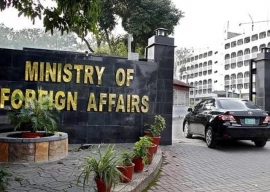
A Bangladesh court on Thursday sentenced 14 people to death, including the leader of Jamaat-e-Islami (JI), over a massive arms smuggling racket ten years ago.
JI leader Motiur Rahman Nizami, 70, was sentenced to hang after being convicted over the racket involving 10 truckloads of arms seized by police at a Bangladesh port.
"The judge sentenced 14 people including .... Motiur Rahman Nizami, to death on smuggling charges," prosecutor Kamal Uddin Ahmed told AFP from the southern port city of Chittagong.
"We're satisfied with the verdict. This is an unprecedented case and all those accused have got due justice," Ahmed said.
Prosecutors said Nizami, who was industries minister at the time, helped unload the weapons that included 4,930 sophisticated firearms, 27,020 grenades and 840 rocket launchers in April 2004.
Nizami, in custody since 2010, was among 50 people charged with smuggling and other offences over the weapons that were meant to be moved across the border to a rebel group in northeastern India.
Ex-home minister Lutfozzaman Babar and the former chiefs of the country's two main intelligence agencies were also among the 14 who were sentenced to death on Thursday over the racket.
A leader of the United Liberation Front of Asom (ULFA), Paresh Baruah, was also sentenced to death in absentia over the racket, which was meant to help the group's separatist struggle. Baruah has long been on the run.
The judge confirmed in his verdict "that the massive arms were meant to be smuggled across the border to ULFA," Ahmed said.
Security was tight in Chittagong for the judge's long-awaited verdict following a year-long trial.
Extra police and elite Rapid Action Battalion (RAB) officers were deployed in key areas as a precaution, amid concerns activists from the Jamaat-e-Islami party could take to the streets to protest the decision.
Nizami was a minister in the government of Khaleda Zia's Bangladesh Nationalist Party which was allied with Jamaat.
The parties were thrown out of power after suffering a massive defeat in December 2008 elections.
The secular Awami League-led government, which retained power after the January 5 elections, has pursued the arrests of the alleged major figures in the case since coming to power.
COMMENTS (58)
Comments are moderated and generally will be posted if they are on-topic and not abusive.
For more information, please see our Comments FAQ










































@yaser: Another conspiracy theory master who finds India every where.
@Syed Faisal: These are not Islam loving people. These are the people who use religion for their personal gain and bring bad name to Islam by committing inhuman deeds. .
@Ch. Allah Daad: A logical analysis and in addition the state has not allowed the fanatic groups to gain upper hand in BD.
@Shabir:
And look how all the compassion Pak showed towards "its own people" made it so peaceful, prosperous and strong!!
@Ch. Allah Daad: Number 7 should be on the top......
Bangladeshi government is unconstitutional , fascist , trying to execute islam loving people.
Even the western countries have objected the way courts in BD are working and doing injustice in the name of justice.These are in fact kangaroo courts.which do not believe in fair play and principles.It is really unfortunate that in most Muslim countries political revenge is a common practice.butthe time will change and evil forces will reap what they are sowing today.
Well..as I seen above all comments, everyone is patriotic to own country. . Just what I believe, if any countries fail to establish justice and brotherhood never gonna be prospective..im bangladeshi, I feel indian subcontinent could be United like European union which is we have all potential. .just ethical conflict and fanaticism destroying us..we should over come it..straightway, banned all religious so called party. .islam never been spread by swords or extremism. .love and peace is Islam as well as respect other believers . banned jamat islam in subcontinent. They are main culprit. .
I don't think BD will become another Syria, Pakistan or Afghanistan. Here are few points for consideration. 1. The majority of BD Muslims follow Sufi Islam. 2. Extremists are less than 10%. 3. Minorities are more than 20%. 4. Neighbour's of BD are very friendly. 5. World powers have no interest in BD. 6. Nationalist forces are very strong. 7. BD people have no race or language issues.
@Shabir: Sentencing some one for crimes like smuggling of mass murder weapons is not right for you?
Religion is not involved in this except the fact that the accused is a head of a religious party. If anything he should be blamed for bringing religion in to his illegal activities.
@Kiran: Pakistan GDP is at-least twice the size of Bangladesh, its land mass is four times larger than Bangladesh. Here is the catch.
Our courts should have to learn a lot of things from bangladesh.We already under destructive path and not be like another somalia !
@Shabir: On which point your country is better than bangladesh other than in cricket, my dear ?
Good stuff, pk govt should consult judiciary in Bangladesh for impotency treatment of pk judiciary.
Whom are capital punishment they deserved it. .They were strongly involved in this case..moreover bangladeshi ppl are not fanatics like others so that no chance for loose the track..just bit need to clean some sort of fanatical so called islamic party like JI..
This all is a part of dirty scheme played by Indian government to hold back Bangladesh Nationalist Party (BNP) and people that are in support of Pakistani influence. Awami League has always been a against Pakistan since they are controlled and funded by India. Sooner we will see Bangladesh as state of India.
@Shaikh Mohommad:
Is it Kangroo because you don't like the decision?
max, Bangladesh is doing this to prevent itself from becoming Syria or Waziriastan. Pakistan, meanwhile, is already there.
Looks like Bangladesh has wisely studied what has happened to Pakistan, and is trying to prevent such a situation in its own country.
Wow!
Another Muslim country on verge of collapse. I thought that They had successfully burried the old hatchet but No...they want themselves to be destroyed on demand of their Foriegn Bosses...
@Ali: You mean Kangaroo court?
The truth will always out. This man is accused of crimes against humanity.
This mass murderer deserve this penality.Good work by bangladesh government and judiciary.
I wonder why it isn't happening in Pakistan?
Revenge against its own people will lead Bangladesh no where and their economy will weaken. I feel we are much better as a democratic country when I look at countries like Bangladesh and Egypt.
2 years down Bangla is going to be new Syria or Waziristan... Let's all hold their jubilations for another year or so till this turns violent
Thats how decisions of judges speak for justice itself, in land of pure judges speak through remarks with shameful sponsorship of media group on u scratch my back and I scratch your back basis.
Interesting how our people (both liberals and rightists) abandon their beliefs when it suits them. Jamaatis are okay with their leaders who were involved in genocide in 1971 (yet are accusing the army of the same now), and the liberals are okay with sham courts and death penalties.
Congratulations to Bangladesh judicial system for bringing high profile figures to book irrespective of their religious and political affiliations. Pakistan needs to learn a lot from its former younger brother who is beating it on all fields except cricket.
Way to go Bangladesh...
Here we go again.
Good, let this be a warning and a lesson for all those who use religion for political purpose and incite people to kill, in the name of religion, those who think different. I'm all for it, Bangladesh is doing a great service to humanity and religion. Religion is never meant to be an instrument of mass murder anywhere including Muslim world.
Bangla Government has done a good job , but could their intelligence tell where did these arms come from ? Such a huge amount of arms can only be transported by acknowledgement of a country . At least India should thank this gov for its commendable job and award something.
Wish we could borrow services of Bangladesh Judges for few months. Lot of mess to be cleared here as well but judiciary is busy in important tasks, Musharraf, PTV MD, Cricket board MD etc. all need justice....